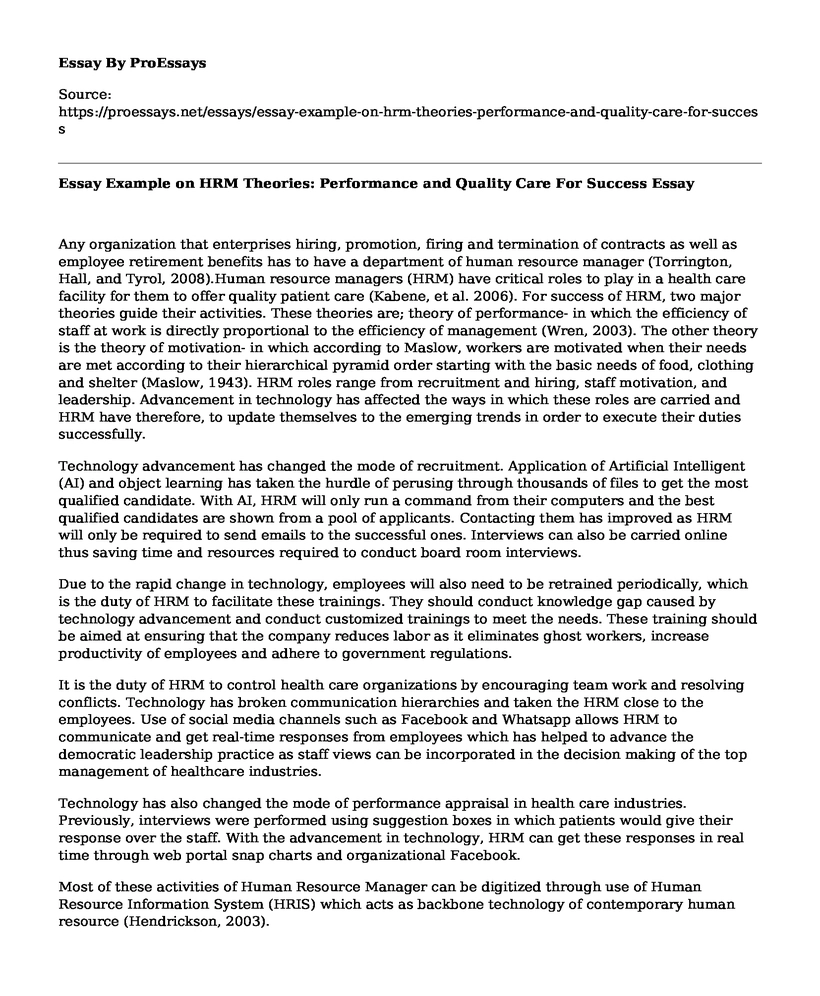Any organization that enterprises hiring, promotion, firing and termination of contracts as well as employee retirement benefits has to have a department of human resource manager (Torrington, Hall, and Tyrol, 2008).Human resource managers (HRM) have critical roles to play in a health care facility for them to offer quality patient care (Kabene, et al. 2006). For success of HRM, two major theories guide their activities. These theories are; theory of performance- in which the efficiency of staff at work is directly proportional to the efficiency of management (Wren, 2003). The other theory is the theory of motivation- in which according to Maslow, workers are motivated when their needs are met according to their hierarchical pyramid order starting with the basic needs of food, clothing and shelter (Maslow, 1943). HRM roles range from recruitment and hiring, staff motivation, and leadership. Advancement in technology has affected the ways in which these roles are carried and HRM have therefore, to update themselves to the emerging trends in order to execute their duties successfully.
Technology advancement has changed the mode of recruitment. Application of Artificial Intelligent (AI) and object learning has taken the hurdle of perusing through thousands of files to get the most qualified candidate. With AI, HRM will only run a command from their computers and the best qualified candidates are shown from a pool of applicants. Contacting them has improved as HRM will only be required to send emails to the successful ones. Interviews can also be carried online thus saving time and resources required to conduct board room interviews.
Due to the rapid change in technology, employees will also need to be retrained periodically, which is the duty of HRM to facilitate these trainings. They should conduct knowledge gap caused by technology advancement and conduct customized trainings to meet the needs. These training should be aimed at ensuring that the company reduces labor as it eliminates ghost workers, increase productivity of employees and adhere to government regulations.
It is the duty of HRM to control health care organizations by encouraging team work and resolving conflicts. Technology has broken communication hierarchies and taken the HRM close to the employees. Use of social media channels such as Facebook and Whatsapp allows HRM to communicate and get real-time responses from employees which has helped to advance the democratic leadership practice as staff views can be incorporated in the decision making of the top management of healthcare industries.
Technology has also changed the mode of performance appraisal in health care industries. Previously, interviews were performed using suggestion boxes in which patients would give their response over the staff. With the advancement in technology, HRM can get these responses in real time through web portal snap charts and organizational Facebook.
Most of these activities of Human Resource Manager can be digitized through use of Human Resource Information System (HRIS) which acts as backbone technology of contemporary human resource (Hendrickson, 2003).
The rapid change in technology has also given Human Resource Managers leadership and managerial roles. HRM inputs are needed in making organizational decisions such as size and demographics of staffing. Investment in Human resource Management is no longer seen as a cost that only reduces returns and profits of these organizations but as an investment that guarantees these returns. The future success in heath industries will not only depend on balance sheet and trading profit and loss account but also on human resource.
References
Hendrickson, A. R. (2003). Human Resource Information Systems: Backbone Technology of Contemporary Human Resources. Journal of Labor Research, 24(3), 382-394.
Kabene, S. M., Orchard, C., Howard, J. M., Soriano, M. A., & Leduc, R. (2006). The Importance of Human Resources Management in Health Care: A Global Context. Human Resources for Health, 4(1), 20.
Maslow, A. H. (1943). A Theory of Human Motivation. Psychological Review, 50(4), 370.
Torrington, D., Hall, L., & Taylor, S. (2007). Human Resource Management. Prentice Hall.
Wren, D. A. (2003). The Influence of Henri Fayol on Management Theory and Education in North America. Entreprises Et Histoire, (3), 98-107.
Cite this page
Essay Example on HRM Theories: Performance and Quality Care For Success. (2023, Jan 11). Retrieved from https://proessays.net/essays/essay-example-on-hrm-theories-performance-and-quality-care-for-success
If you are the original author of this essay and no longer wish to have it published on the ProEssays website, please click below to request its removal:
- Motivation for Leisure Essay
- Personal Statement: Pediatric Nurse Practitioner (PNP)
- Cultivating a Healthy Relationship With Social Media Essay Example
- Maximize Time to Maximize Money - Essay Sample
- Be a Beautician: Endless Opportunities in Stylish Career - Essay Sample
- Essay on Unlock Your Goal-Setting Power: Motivation & Self-Regulation
- Mental and Physical Tasks - Report Example







